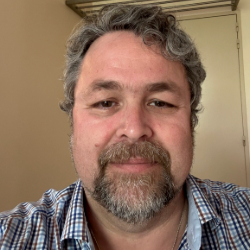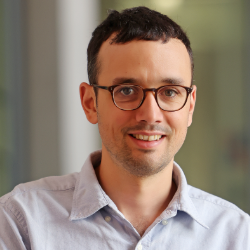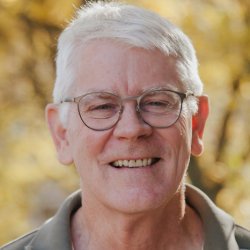2024 August Prize Spotlight
Congratulations to the following 2024 SIAM prize recipients who were recognized at the 25th International Symposium on Mathematical Programming, which took place from July 21-26, 2024 in Montréal, Canada.
- Jérôme Bolte and Edouard Pauwels – Lagrange Prize in Continuous Optimization
- Stephen Wright – George B. Dantzig Prize
Jérôme Bolte and Edouard Pauwels
Dr. Jérôme Bolte and Dr. Edouard Pauwels, Toulouse School of Economics, are the 2024 recipients of the Lagrange Prize in Continuous Optimization. According to the award citation, the team received the prize for their paper “Conservative set valued fields, automatic differentiation, stochastic gradient methods and deep learning,” published in Mathematical Programming in 2020. “Bolte and Pauwels introduce generalized derivatives called conservative fields and provide variational formulas for non-smooth automatic differentiation oracles with applications in stochastic gradient methods.”
The pair model the algorithmic differentiation operation via new variational objects called conservative set valued fields. They also conduct the convergence analysis to critical points for non-smooth stochastic first-order methods. Their paper combines techniques from several fields including non-smooth analysis, first-order stochastic approximation, machine learning, and algorithmic differentiation, with a central role played by o-minimal geometry. Dr. Bolte and Dr. Pauwels thus provide a remarkable theoretical and algorithmic contribution to the field of continuous optimization.
The Lagrange Prize in Continuous Optimization is awarded every three years for an outstanding contribution in the area of continuous optimization published in the six calendar years prior to the award year. The Mathematical Optimization Society (MOS) administers the prize and it is awarded jointly by MOS and SIAM.

The award is based primarily on the work's mathematical quality, significance, and originality. Clarity and excellence of the exposition and the value of the work in practical applications may be considered as secondary attributes. The extended period of six years reflects the fact that the value of fundamental work cannot always be immediately assessed.
Dr. Jérôme Bolte is a full professor at the Toulouse School of Economics and holds a Chair in Artificial Intelligence at the Artificial Intelligence Institute of Toulouse. He studied pure and applied mathematics, completing a degree in mathematics, followed by a doctorate at Montpellier University. Prior to moving to Toulouse in 2010, he spent six years as an associate professor at Sorbonne University in Paris and one year at École Polytechnique. He received the 2017 SIAM Activity Group on Optimization Best Paper Prize, along with Shoham Sabach and Marc Teboulle, for work at the crossroads of semi-algebraic geometry and first-order methods. Dr. Bolte is currently an associate editor at Mathematical Programming and Foundations of Computational Mathematics. His research interests range from continuous optimization to machine learning.

Dr. Edouard Pauwels has been a professor at the Toulouse School of Economics since 2023. He defended his Ph.D. in machine learning applied to bioinformatics in 2013 and became an assistant professor in in the computer science department of Paul Sabatier University in 2015. His research focuses on numerical optimization and machine learning. He received the 2020 National Center for Scientific Research Bronze Medal and was appointed a member of the Academic Institute of France (2022), both significant national distinctions. Dr. Pauwels is currently an associate editor at the Journal of Optimization Theory and Applications and Mathematical Programming.
The authors collaborated on their answers to our questions.
Q: Why are you all excited to receive the award?
A: This award constitutes a significant international recognition of our contributions, and we are honored to follow in the footsteps of many distinguished researchers. Our daily work in research is meticulous and delicate, with our heads down and focused, so the relevance of our work is primarily based on our own judgment and that of our close colleagues. The award is exciting because it represents an independent confirmation of the quality of our work and its relevance for optimization and machine learning.
Q: Could you tell us about the research that won your team the award?
A: The bulk of our contribution was to build and study a nonsmooth differential calculus that aligns with worldwide empirical practices, particularly the deployment of the famous backpropagation algorithm in numerical programs regardless of their regularity. Modern libraries like PyTorch, TensorFlow, and Jax are all equipped with such automatic differentiation commands. Our results also provide tools to analyze many other methods central to AI, such as well-known algorithms like SGD and ADAM. The approach we developed blends optimization, nonsmooth analysis, and crucially, o-minimal geometry. This research is part of a broader program at the crossroads of optimization, machine learning, and geometry, which is currently being advanced in Toulouse and in many other places around the world.
Q: What does your team’s work mean to the public?
A: Modern AI algorithms that perform image classification, chatbot interactions, or generative AI, like ChatGPT or Dall-E, rely on key auxiliary algorithms to tune the system and enhance its intelligence. The most famous of these algorithms is the backpropagation algorithm which is the building block for tuning neural networks. Historically, these algorithms lacked a general comprehensive theoretical framework, making rigorous analysis of AI outputs even more challenging. Our theoretical contribution provides an advancement in understanding the functioning of AI, adding one more step towards comprehending modern AI systems.
Q: What does being members of SIAM mean to you both?
A: SIAM is probably the largest global forum and scholarly association that brings together applied mathematicians. Being a SIAM member connects you to this vast community and keeps you informed about the latest developments.
Interested in submitting a nomination for the Lagrange Prize in Continuous Optimization? Mark your calendar – the next call for nominations opens May 1, 2026.
Stephen Wright
Dr. Stephen Wright, University of Wisconsin - Madison, is the 2024 recipient of the George B. Dantzig Prize. He received the prize for his fundamental contributions to nonlinear optimization and algorithms for control, compressed sensing, machine learning, and data science. He pioneered infeasible interior point methods which culminated in his 1997 SIAM monograph on the subject. Moreover, Dr. Wright contributed highly cited, outstanding, and very influential work in a broad range of fields in mathematical optimization, including algorithms for control, nonsmooth optimization with applications to compressed sensing, machine learning, and data science. His comprehensive contributions range from theory, algorithm design and analysis, to applications and the development of high-impact software.
The George B. Dantzig Prize is awarded ever three years to one or more individuals for original research which by its originality, breadth, and depth is having a major impact on the field of mathematical optimization. The Mathematical Optimization Society (MOS) administers the prize and it is awarded jointly by MOS and SIAM.

Dr. Wright holds the George B. Dantzig Professorship, the Sheldon Lubar Chair, and the Hilldale Professorship at the University of Wisconsin-Madison and serves as Chair of the Computer Sciences Department. His research is in computational optimization and its applications to data science and many other areas of science and engineering. Prior to joining UW-Madison in 2001, he held positions at North Carolina State University (1986-90) and Argonne National Laboratory (1990-2001).
Dr. Wright was elected to the SIAM Board of Trustees for the maximum three terms (2005-14) and has served as Chair of the Mathematical Optimization Society (2007-10). He has remained an active member of SIAM for 38 years and was named a 2011 SIAM Fellow. He served as Editor-in-Chief of SIAM Journal on Optimization (2014-19) and Mathematical Programming Series B. He has also served as an associate editor of Mathematical Programming Series A, SIAM Review, SIAM Journal on Scientific Computing, and several other journals and book series.
In 2014, Dr. Wright won the Institute of Electrical and Electronics Engineers (IEEE) W.R.G. Baker Award for best paper in an IEEE archival publication during 2009-2011. Additionally, he was awarded the 2020 Khachiyan Prize by the INFORMS Optimization Society for lifetime achievements in optimization, as well as the 2020 Neural Information Processing Systems Conference Test of Time Award. He was also recently elected to the National Academy of Engineering in 2024. He has authored and co-authored widely used text and reference books in optimization including Primal Dual Interior-Point Methods and Numerical Optimization. He has published widely on optimization theory, algorithms, software, and applications.
Q: Why are you excited to receive the award?
A: I'm thrilled to receive the George B. Dantzig Prize because it is a high honor bestowed by the optimization community, which I am so proud to be a part of. Having been deeply involved with MOS and SIAM, the two societies that sponsor the prize, it is particularly gratifying to be honored in this way.
Q: Could you tell us about the research that won you the award?
A: The Dantzig prize is a career prize, and my research over the years has covered many areas of continuous optimization and its applications. I have worked on nonlinear constrained optimization and nonsmooth optimization at various times. I had great fun participating in the interior-point "gold rush" of the 1990s, writing a book on that subject in 1997 and contributing several software packages. I started working on algorithms for compressed sensing and machine learning around 2006, and much of my work since then has focused on optimization topics relevant to machine learning.
My interest in algorithms is a constant theme. I like to work on algorithms that are useful in practice and to understand their mathematical properties. I apply these algorithms to interesting problems in science and engineering, collaborating with domain experts in machine learning, process control, computational statistics, image processing, computer networking, cancer treatment planning, and several other areas. In some cases, this work has been quite influential. Optimization is a field that is interdisciplinary by nature, producing modeling techniques and algorithmic tools that are useful to wide communities of researchers and practitioners. Besides relishing the interdisciplinary and practical sides of the field, I love its mathematical depth and enjoy participating in the interplay between theory and practice that has been a driving force in the development of the area.
It has been exciting to witness the remarkable growth in the profile of optimization in recent years. More and more domain researchers are discovering the usefulness of optimization as a way to organize models and objectives in a structured, systematic way, and also as a source of algorithmic, computational techniques to find useful solutions to the resulting problems. Optimization is indispensable to the machine learning/AI revolution, a fact that accounts in part for the increased scope and intensity of optimization research, and the growing number of researchers in the area. The skill level of younger researchers working in optimization is incredible, and both daunting and inspiring.
Q: What does your work mean to the public?
A: Because it is deeply embedded in so many technologies, optimization touches members of the public in many ways. Like many optimization researchers, algorithms and software and applications that I have worked on have touched many products in daily use; for example, in recommender systems for online commerce, investment portfolio optimization, and process control in chemical production to name a few. I believe that my books, particularly Numerical Optimization with co-author Jorge Nocedal, have spread the word about optimization to several generations of researchers, students, and practitioners.
Q: What does being a member of SIAM mean to you?
A: The prize is jointly sponsored by MOS and SIAM, and both societies are close to my heart. I remember seeing SIAM journals in the library at my father's workplace as a boy. I joined SIAM as soon as I graduated, in 1985, later serving on the Board of Trustees for nine years and as Editor-in-Chief of SIAM Journal on Optimization for five years. I served in the leadership of MOS for 17 years, including a term as Chair. Both societies do a wonderful job nurturing and promoting their overlapping professional communities through their journals, conferences, and book series. I helped to establish the MOS-SIAM Series on Optimization. Through both societies, I have been privileged to work alongside colleagues whose dedication to service and research accomplishments are constant sources of inspiration.
Interested in submitting a nomination for the George B. Dantzig Prize? Mark your calendar – the next call for nominations opens May 1, 2026.
Stay Up-to-Date with Email Alerts
Sign up for our monthly newsletter and emails about other topics of your choosing.



